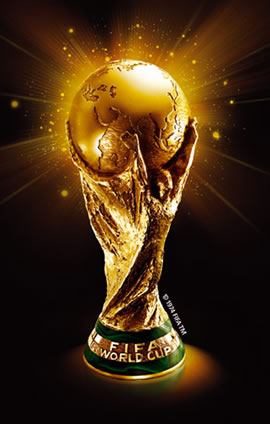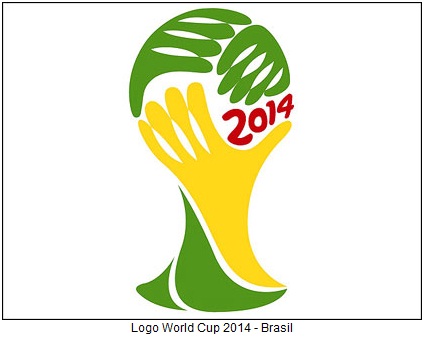Thursday, February 24, 2011
AWESOME CHAMPION! ASIA FOR ASIA!
It's obvious! Japan is the biggest powerhouse in Asia region. It is proven since the Kublai Khan era when Kublai Khan and his Mongolian army wants to take over Japan but the country of the rising sun was protected by the tsunami that has washed away all the army forces. The US army was afraid of the Japanese in the World War ll. Even had been blown away by atom boms (Hiroshima and Nagasaki),their economy are still at steady state. p/s: if the bom hits Malaysia,haih~ i think we're gonna go back outside the civilization for ages! no offense.heee :) But in the final match of the Asian Cup,it was not that awesome.huhu. Both Japan and Australia we're too carefully played. Unlike Brazil or the Germans. But in the end a goal from Tadanari Lee settled the score and the Blue Samurai is the champion of Asia once again!
Tuesday, February 22, 2011
My top 5 awesome things!
Friday, February 18, 2011
1. The only unbeaten team at the 1974 World Cup was Scotland, despite which, they still went out in the first round as their goal difference, from their one win and two draws, was less than both Yugoslavia and Brazil.
2. The youngest player to appear at the World Cup was Norman Whiteside who was 17 years and 41 days old when he took the field for Northern Ireland versus Yugoslavia in 1982.
3. The youngest player to appear in the World Cup Final was Pele who was 17 years and 249 days old when he was part of the Brazil team who beat Sweden 5-2 in 1958.
4. The shortest World Cup career goes to Marcelo Trobbiani of Argentina who spent a grand total of just one minute on the pitch after coming on as a substitute in the 1986 final. It was his only ever appearance at the World Cup.
5. England’s third goal in the 1966 final, irrespective of what some believe, did not cross the line and should not have counted as a goal!
6. The 500th goal in the World Cup finals was scored by Bobby Collins of Scotland during their 3-2 defeat against Paraguay in 1958.
7. Roger Milla, of Cameroon, is the oldest player to feature at the World Cup, he was 42 years and 39 days old when he played against Russia in 1994. He also scored that day to become the oldest goal scorer. Worryingly, a member of the Cameroon delegation claimed that Milla was actually over 46!
8. The first example of a father selecting his son to play at the World Cup happened in 1966 when Uruguay coach Ondino Viera selected son Milton Viera.
9. The only time that East Germany met West Germany in a game of football happened at the 1974 World Cup. East Germany ran out 1-0 victors; West Germany went on to win the World Cup that year!
10. Belgium’s first choice goalkeeper at the 1982 World Cup was Jean-Marie Pfaff but, because of a misdemeanour, he was dropped after their third game. He was replaced by Theo Custers for the next game, but after they had lost by 3 goals to Poland he was never capped again – quite literally ‘Custers’ last stand’.
11. One of the big stars of the 1990 World Cup was Rene Higuita, the Colombia goalkeeper. He would have been one of the big stars of the 1994 World Cup but missed out because he was in jail on charges of kidnapping.
12. The only player to appear at the World Cup finals whilst playing for an Irish club was Patrick Joseph ‘Felix’ Healey. He played for Northern Ireland in 1982 while employed with Irish club Coleraine.
13. The first World Cup match to be televised was the Hungary versus Brazil match on 27th June 1954. Hungary won 4-2.
14. Juan Ignacio Basaguren became the first substitute to score in the World Cup finals when he put the ball in the back of the net during Mexico’s 4-0 victory against El Salvador in 1970.
15. During the 1990 World Cup, the Italian goalkeeper Walter Zenga went an impressive 517 minutes without conceding a goal.
16. Bolivia had to wait a total of 64 years for their first goal at the World Cup finals. They first appeared at the World Cup in 1930 and didn’t qualify again until 1994; Erwin Sanchez scored the goal in a 3-1 loss to Spain.
17. When Brazil took to the field against Yugoslavia at the 1930 World Cup, they did so with a total of 10 players who had never been capped before. Four years later Argentina fielded 10 new caps against Sweden.
18. There was a grand total of 28 red cards dished out at the 2006 World Cup. On the subject of red cards, Argentina’s Claudio Caniggia was sent off at the 2002 World Cup despite not actually playing.
19. Emerson, who was captain of Brazil, missed out on the 2002 World Cup after damaging his shoulder while ‘mucking’ about during training.
20. Scotland have qualified for the World Cup finals on 8 occasions; they have never qualified through from the first rounds. Pretty poor showing but they did score one of the best World Cup goals ever – every cloud has a silver lining.


Wednesday, February 16, 2011
VOTE!


- With 44 million millennial voters eligible to vote, your vote can make a huge difference when banded with others in your demographic.
- You're in college. You're expanding your mind, your spirit, your life. You're challenging yourself in new and exciting ways and learning things you may not have ever considered before. But when the time comes, you're going to pass on empowering yourself by voting? Really?
- No matter your race, gender or age, your right to vote came at a price. Honor the sacrifices others made so that your voice could be heard when theirs wasn't.

- True, it may be a representative democracy, but your elected representatives still need to know how their constituents think in order to accurately represent them. They are counting on your vote as part of that process.
- Despite conventional attitudes about college students not being in the "real world," much of your daily life involves very serious and important decisions. You manage your finances; you are taking charge of your education and career; you are doing your best, every day, to improve yourself through higher education. In essence, you are becoming an adult (if you aren't one already). Your vote, then, matters most because you are finally able to cast it. Go voice your opinions on issues, policies, candidates, and referendums. Stand up for what you believe in. Vote!

Sunday, February 13, 2011
NATIONAL TEAM HISTORY
![[Malaysia-1986Home.png]](https://blogger.googleusercontent.com/img/b/R29vZ2xl/AVvXsEgzK-kJRZMB3TBKIq_gpBoSS8M8Cv8XBKLqPgGhyphenhyphen4LLGrSljc0dYFFztZ3PVkkfUGpOyUmJBqwcp2exqxfXQo0ZsaA9gsnDs-Rk8LxTibbvMz5_wVBPRt7q3y6P9lj8WaU0VzLl21IqxjI9/s1600/Malaysia-1986Home.png)
![[518px-Football_Association_of_Malaysia_crest.svg.png]](https://blogger.googleusercontent.com/img/b/R29vZ2xl/AVvXsEg-zQRkzaDKp0pxLWSONsTUR0-Ld2-KR4GbL_spe51-2jQM2UJaSd321_qTTVaG3MhG56uoUiREp7ZUyI29Zs2RRil_Sv9Lr9cPt1v2MZ192JW9OiL2CMAhMaMIUZ1dREG4kkKCzTStwrmR/s1600/518px-Football_Association_of_Malaysia_crest.svg.png)
Thursday, February 10, 2011
LEADERS ARE MADE!
 I am absolutely convinced that good leaders are made than born. If you have the desire and willpower, you can become an effective leader. “Good leaders can develop through a never ending process of self-study, education, training and experience. To inspire workers into higher levels of teamwork, there are certain things a leader must be, know, and, do. These do not come naturally, but are acquired through continual work and study. Good leaders are continually working and studying to improve their leadership skills; they are NOT resting on their laurels.
I am absolutely convinced that good leaders are made than born. If you have the desire and willpower, you can become an effective leader. “Good leaders can develop through a never ending process of self-study, education, training and experience. To inspire workers into higher levels of teamwork, there are certain things a leader must be, know, and, do. These do not come naturally, but are acquired through continual work and study. Good leaders are continually working and studying to improve their leadership skills; they are NOT resting on their laurels.

Monday, February 7, 2011
The 2014 World Cup is heading to Brazil. In less than 4 years, the greatest football spectacle of them all will be heading to the country that introduced the notion of the beautiful game. For the first time in 64 years, football’s biggest event will grace Brazil’s shores and a feast of football is sure to be served up in front of passionate crowds. True, there is the small matter of the World Cup in South Africa in 2010 to contend with first, but football fans across Brazil and indeed the world are rubbing their hands in anticipation of the 2014 Brazil World Cup.
The 2010 World Cup just over last year. And it's time for 2014 World cup which will be held at BRAZIL as well. Brazil was eliminated in the quarter-finals of 2010 FIFA World Cup at the hands of the eventual runners-up the Nethherlands. Combined with the team’s exit at the same stage of the 2006 tournament in Germany, it marked the first time in 20 years that ASeleção had missed out on a place in the semi-finals in two consecutive FIFA World Cup tournaments. In any other country, this might have led to feelings of doom and gloom, or at least a lingering sense of disillusionment. But, when it comes to football in particular, Brazil is not just any other country. Following the initial shock of the Dutch defeat, there was little sign of ill-will towards the national team.
National flags could still be seen fluttering and a brisk trade in green-and-yellow FIFA World Cup-related merchandise continued, even weeks after the tournament had come to an end. This was not just the tail-end of Brazils dressing up every four years to celebrate the FIFAWorld Cup. This time there was a real sense that Brazilians were keen to keep that World Cup fever alive, even if the latest edition had ended with less glory than usual for the national team. The main reason for this feeling of national pride lies less than four years in the future. For in Brazil, the blowing of the final whistle of the 2010 FIFA World Cup signalled the start of a new four-year cycle that will culminate in the return of world football’s biggest event to the country which has won the tournament more often than any other nation.
With the 2014 World Cup being awarded to Brazil, it could be easily argued that football is going home. Ok, so football originated in Britain and we invented the game but the Brazilians have perfected it. They’ve taken the game to their hearts and elevated it to the extent that it is a religion to the people. The blue and yellow clad players of Brazil have given us some memorable moments and play the game with a style and rhythm that no other nation on earth seems capable of. The game is played to a samba beat that runs through the heart and soul of the entire country. When they are on song, they are unstoppable and people the world over clamour to see them play. Chances are, if you asked people to name the team they want to see win aside from their own it would be the magicians from Brazil.
Over the years, the Brazilians have given us players that are routinely rated as the best in the world and of course given the game arguably the greatest player ever to have lived, EdsonArantes du Nascimento or Pele as we know him best. If you look through the annals of Brazilian Internationals it reads like a who’s who of footballing greats. From Gerson, Garrincha, Rivelinoand Jarzinho in the 50’s, 60’s and 70’s, to Socrates and Zico in the 80’s. In more recent times we have enjoyed the skill of Romario, Ronaldo, Rivaldo and of late Ronaldinho, Kaka and Adriano. All of these players at their peaks would waltz into a world XI. It's not as though they’vehad a few stars in the sides over the years but full squads of players that other international coaches would dream of having in their starting elevens.
Having great individuals does not always make a great side but the Brazilians have won more World Cups than any other nation. They stand at 5 wins, with Italy in 2nd place with four. But they’ve also played in a number of finals where they’ve been beaten, most recently in 1998 against the host nation France. Winning, however, isn’t the only thing, it’s winning with style that matters to Brazilians. The World Cup win in 1994 was a triumph but was not won in Brazilian attacking flair and flamboyance. The 1982 side of Zico and Socrates, that were foiled by Italy, probably bring more of a misty eyed response than the side that were victorious in the USA.
The 2014 finals will be a celebration of football. The fans will embrace it and produce a carnival of colour, noise and passion that the local people are already world famous for. It will be a fantastic world cup to travel to and see how the Brazilians party. It will have been 64 years since the last world cup was held in Brazil and those who were alive to see it will hope that itdoesn’t end the same way. The hosts were beaten in the final by South American rivals Uruguay. Anything less than a win will send the country into mourning, but a victory will spark the biggest party Brazil has ever seen and that in itself would be saying something.



Wednesday, February 2, 2011
SIBLINGS







